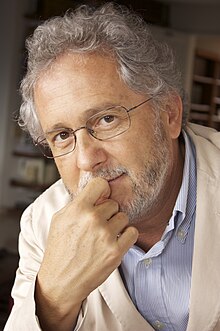Héctor Abad Faciolince
| Héctor Abad Faciolince | |
|---|---|
 |
|
| Born | 1958 Medellín, Colombia |
| Occupation | novelist, essayist, journalist, and editor |
| Nationality | Colombian |
| Period | 1991 - |
| Genre | Essay, fiction, non-fiction |
| Literary movement | Latin American literature |
Héctor Abad Faciolince (born 1958) is a Colombian novelist, essayist, journalist, and editor. Abad is considered one of the most talented post-Latin American Boom writers in Latin American literature. Abad is best known for his bestselling novel Angosta, and more recently, El Olvido que Seremos (t. Oblivion: A Memoir).
Héctor Abad Faciolince was born and raised in Medellín (Colombia), the only boy -among five sisters- of Cecilia Faciolince and Héctor Abad Gómez. Abad’s father was a prominent medical doctor, university professor, and human rights leader whose holistic vision of healthcare led him to found the Colombian National School of Public Health.
After graduating from an Opus Dei-run private Catholic school, Abad moved to Mexico City in 1978 where his father was appointed as Cultural Counselor of the Colombian Embassy in Mexico. While in Mexico, he attended literature, creative writing and poetry workshops at La Casa del Lago, the first off campus cultural center of the National Autonomous University of Mexico.
In 1979, Abad moved back to Medellín and pursued studies in Philosophy and Literature at the Universidad Pontificia Bolivariana. Later in 1982, he was expelled from the University for writing an irreverent article against the Pope. He then moved to Italy and completed studies on Modern Languages and Literature at the University of Turin in 1986. Abad graduated with the highest academic honors of summa cum laude, and his thesis on Guillermo Cabrera Infante’s Three Trapped Tigers was also awarded "Dignitá di Stampa" (a special distinction that literally means "worthy of publication").
...
Wikipedia
